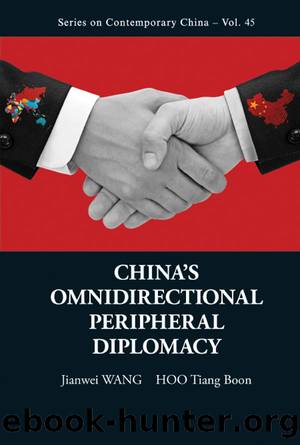China's Omnidirectional Peripheral Diplomacy by Jianwei Wang & Tiang Boon Hoo

Author:Jianwei Wang & Tiang Boon Hoo [Wang, Jianwei & Hoo, Tiang Boon]
Language: eng
Format: epub
Tags: Political Science, International Relations, General, Security (National & International), World, Asian
ISBN: 9789813141780
Google: xyXbjwEACAAJ
Goodreads: 30554943
Publisher: World Scientific Publishing Company Pte Limited
Published: 2018-01-15T07:07:13+00:00
The Philippinesâ Arbitration Initiative and Chinaâs Response
The arbitration instituted by the Philippines against China was submitted to the Permanent Court of Arbitration at Hague on January 22, 2013. On the same day, the Department of Foreign Affairs of the Philippines presented a note verbale to the Embassy of China in the Philippines, stating that the Philippines has submitted a Notification and Statement of Claim in order to initiate compulsory arbitration proceedings under Article 287 and Annex VII of the United Nations Convention on the Law of the Sea (âConventionâ) with respect to the dispute with China over âmaritime jurisdictionâ in the South China Sea. On February 19, 2013, the Chinese Government rejected and returned the Philippinesâ note verbale together with the attached Notification and Statement of Claim. In response, the Chinese government stated that China âwill neither accept nor participate in the arbitration unilaterally initiated by the Philippines.â
Although China neither accepted nor participated in the arbitration, Chinaâs response through a government document âPosition Paper of the Government of the Peopleâs Republic of China on the Matter of Jurisdiction in the South China Sea Arbitration Initiated by the Republic of the Philippinesâ published on December 7, 2014, clearly stated Chinaâs position, that is, the Tribunal lacks jurisdiction to consider the Philippinesâ submissions. Chinaâs response can be summarized in the following points:
First, the essence of the subject-matter of the arbitration is the territorial sovereignty over several maritime features in the South China Sea, which is beyond the scope of the Convention and does not concern the interpretation or application of the Convention;
Second, China and the Philippines have agreed, through bilateral instruments and the Declaration on the Conduct of Parties in the South China Sea, to settle their relevant disputes through negotiations. By unilaterally initiating the present arbitration, the Philippines has breached its obligation under international law;
Third, even assuming, arguendo, that the subject-matter of the arbitration were concerned with the interpretation or application of the Convention, that subject-matter would constitute an integral part of maritime delimitation between the two countries, thus falling within the scope of the declaration filed by China in 2006 in accordance with the Convention, which excludes, inter alia, disputes concerning maritime delimitation from compulsory arbitration and other compulsory dispute settlement procedures;
Fourth, the Arbitral Tribunal manifestly has no jurisdiction over the present arbitration. Based on the foregoing positions and by virtue of the freedom of every State to choose the means of dispute settlement, Chinaâs rejection of and non-participation in the present arbitration stands on solid ground in international law.11
Additional Chinese policy response can be analyzed as follows:
First, China repeatedly states non-acceptance, non-participation in the arbitration. To prevent Chinaâs Position Paper from constituting as a plea, China stressed that âthis Position Paper shall not be regarded as Chinaâs acceptance of or participation in this arbitrationâ. However, the Arbitral Tribunal âdecided in April 2015 that it would treat Chinaâs Position Paper as effectively constituting a plea concerning the Tribunalâs jurisdictionâ. The Arbitral Tribunalâs decision defies Chinese governmentâs statement and cannot be effective and naturally accepted by China.
Download
This site does not store any files on its server. We only index and link to content provided by other sites. Please contact the content providers to delete copyright contents if any and email us, we'll remove relevant links or contents immediately.
Spell It Out by David Crystal(35861)
Life for Me Ain't Been No Crystal Stair by Susan Sheehan(35550)
Cecilia; Or, Memoirs of an Heiress — Volume 1 by Fanny Burney(32095)
Cecilia; Or, Memoirs of an Heiress — Volume 3 by Fanny Burney(31482)
Cecilia; Or, Memoirs of an Heiress — Volume 2 by Fanny Burney(31436)
The Great Music City by Andrea Baker(30932)
Professional Troublemaker by Luvvie Ajayi Jones(29445)
We're Going to Need More Wine by Gabrielle Union(18664)
Twilight of the Idols With the Antichrist and Ecce Homo by Friedrich Nietzsche(18324)
The Secret History by Donna Tartt(18269)
All the Missing Girls by Megan Miranda(14860)
Cat's cradle by Kurt Vonnegut(14806)
Pimp by Iceberg Slim(13828)
Bombshells: Glamour Girls of a Lifetime by Sullivan Steve(13718)
Fifty Shades Freed by E L James(12937)
Talking to Strangers by Malcolm Gladwell(12916)
Norse Mythology by Gaiman Neil(12880)
The Social Justice Warrior Handbook by Lisa De Pasquale(11970)
Underground: A Human History of the Worlds Beneath Our Feet by Will Hunt(11857)
